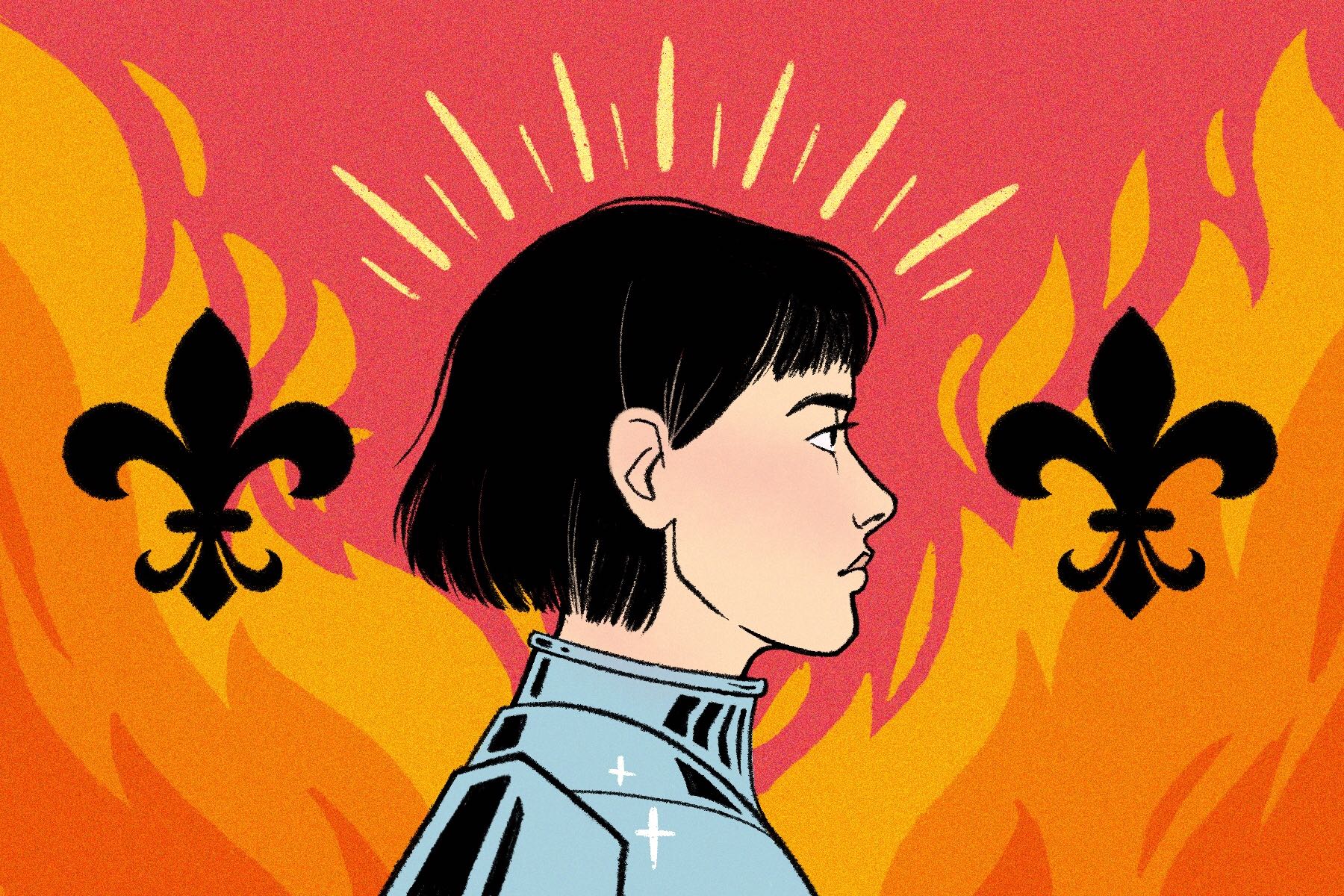Stephanie Hemphill’s “The Language of Fire” is set late in the Hundred Years’ War, a war fought over who should rule France, and France was losing. They were divided between the Armagnac faction, led by the Count of Armagnac and Charles of Orleans (14 years old), and the Burgundian faction, led by the Duke of Burgundy. This divide left the country weak and the English took advantage.
In 1415, they won Agincourt and several small, northern French towns and in 1418, they took Paris. During the siege of Paris, the Count of Armagnac was killed, and Charles VII of Orleans assumed the title of “dauphin” — heir to the throne. He attempted to make a treaty with the Duke of Burgundy, but that was destroyed when Armagnac partisans assassinated John the Fearless. The duke blamed Charles, broke off the treaty and allied the Burgundians with the English.
By 1429, all of northern France and parts of the southwest were under Anglo-Burgundian control, including Reims, the traditional city of coronation. France had lost every major battle and was slowly losing to the English at Orleans, a strategically important city along the Loire River. Among this loss and turmoil came a prophecy: “France would be saved by a virgin from the borders of Lorraine who would work miracles.”
Meanwhile, in the small village of Domrémy in northeastern France, a young girl named Jehanne d’Arc lived with her family on their farm.
“The Language of Fire” follows Jehanne on her journey, through her obstacles and her unwavering faith in her mission and in her God. Five hundred pages written in lyric verse, the novel is split into eight parts which guide the reader through the different stages of Jehanne’s mission from her childhood to her death.
The first part of “The Language of Fire,” “The Light that Sparks the Fire,” opens at the end of Jehanne’s life, May 30, 1431, as she is burning on the stake, feeling abandoned by God, for he is completely silent. The section then goes back to the beginning of her journey — her childhood in Domrémy, where she feels like a “duck fumbling in a flock of geese.” Unlike her friends, she does not care about “which boy is best” and finds their game of determining who is best “more boring than soap.” She would rather race with the boys — and beat them — than sit aside and watch. She feels restless, called to do more than be a wife and mother or a nun. However, as a girl, those were her only options.
At 13, Jehanne receives three messages from God. The first is just calling her name, the second is about her purpose and the last is to tell her that she is La Pucelle, the Virgin Maid prophesied to save France.
The night she is told she is La Pucelle, as she lies by the hearth and questions if the voice told the truth, the firelight envelopes her in warmth — her first vision. As she basks in the warmth and light, the voice tells her once more, “Do not doubt this, Jehanne. You are the girl from the old prophecy. You will be called La Pucelle. You will lead an army. And you will save France.”
From that moment on, Jehanne does not doubt. She begins to prepare, spiritually and physically. She goes to church often, prays in the fields and begins to train as a warrior. She attaches a knife to a stick to teach herself sword fighting, and she sneaks out to ride the neighbors mare whenever she can.
“Part Two: Gathering Fuel for the Fire” follows her next steps on her journey. In the spring of 1428, at 16 years old, Jehanne receives instructions from God to enlist the help of Sir Robert Baudricourt of Vaucouleurs, which is 10 miles from her village. She sneaks onto her uncle’s cart and gains an audience with Sir Robert. However, she is only laughed at and sent home. When her father arranges a marriage without her consent as punishment, she petitions a court and wins — she does not have to enter the marriage. This victory sours her relationship with her father because she refused to submit to his power.
Time passes. Her sister dies and in October of 1428, Orléans is surrounded by the English. A few months later in December, she makes her second journey to Vaucouleurs and this time she wins Sir Robert, as well as many knights, to her side.
Before their journey to Chinon to meet the dauphin, Jehanne learns the importance of brotherhood among her soldiers and begins to dress like a man. She does this so she may be protected from any who may try to assault her and also to look like the soldiers she leads.
In part three of “The Language of Fire,” titled “Kindling,” Jehanne finally gains an audience with the dauphin, but he does not believe her. She points him out as the true dauphin in a crowded room, she knows his most private prayers to God, she is crowned with a golden light as they speak, she is proven to be a virgin and a child of God rather than one of the devil, she predicts the location of a hidden sword and still he and his advisors hesitate to give her an army. When he finally does, she must still wait for armor and a standard.
“Part Four: Where First Comes Smoke, Next Comes Fire” is about all of her successes in battle. She builds an army of righteous soldiers who do not cuss and who confess their sins and pray. Only with a virtuous army would La Pucelle succeed. During these battles, Jehanne represents the courage of God to her soldiers. She defeats the English at Orléans, despite being lied to and kept from war councils and fights a path to Reims so the dauphin can be crowned.
The fifth part of “The Language of Fire,” “A Torch for the King,” is about waiting. This section is when things begin to turn for the worse for Jehanne. After the king is crowned, he does nothing. Instead of sending Jehanne on to Paris while her army is still strong, he keeps her close. Her army falls apart, her commanders leave to tend their farms and God is silent. She is unsure of her purpose anymore for she is not receiving any instructions from God. However, she still gathers what men she can and goes to Paris but is met with defeat. She returns to the king and is named a lady, which gives her family the title du Lys and exempts them from taxes. She is still restless and so gathers men to go to Compiègne, where she is captured by the Burgundians.
Her imprisonment with the Burgundians is not bad. She is kept in nice cells and allowed the company of women. However, she is soon sold to the English because her king refuses to pay her ransom and her friends do not have enough money to pay it.
“Part Six: Face the Flames” is about her imprisonment with the English. They put her on trial and question her for a long time. They keep three guards in her cell, who threaten her with rape and injury. She is not allowed to bathe and not allowed to be imprisoned at the church, which is her right as a woman. She holds out for a long time, able to navigate their tricky words but soon begins to weaken. During this time, God remains silent and she wonders why, but she never loses hope. She also realizes that the reason the men hate and want to break her is because she is a woman who refuses to wear a dress or act like a woman.
In “Part Seven: Burn,” she gets sick and after she is better, she is threatened with torture. Still she does not give in. So, the bishop designs a spectacle to break her. He brings her out into the city and parades her around. He puts her on a stage and makes her sign an abjuration, which comes with the relief of a church prison as long as she wears a dress. But they keep her in her secular prison and leave only pants for her to wear. God finally instructs her to wear the men’s clothing and to not fear the fire, for on the other side is Paradise. She wears the pants and is declared a heretic, excommunicated and handed over to secular authorities
She is allowed the last sacraments before her execution, a sign of mercy. As she burns, she does not hear the voice of God, nor is she granted a quick death. She burns for 20 minutes before life leaves her body.
“Part Eight: Out of the Ashes” considers what she may have seen and thought from heaven after her death. It is more of a biographical summary of what happened after, seen through Jehanne’s eyes. After King Charles finally overthrew the English, he petitioned the Church to reexamine Jehanne’s trial. She was exonerated and a cross was erected in her honor. In 1920, the Catholic Church canonized her as a saint.
Jehanne d’Arc was a misfit country girl, La Pucelle, a warrior, a leader, a prisoner and a heretic. Her purpose and her place in the world changed dozens of times. However, the most powerful part of “The Language of Fire” is Jehanne’s revelation of her purpose after her death. She finally understood that her purpose was not only to save France in her time, but to inspire people through all ages. She may have fought for France and lived for God, but she “burned for the girls who fear the fire inside themselves.”
















